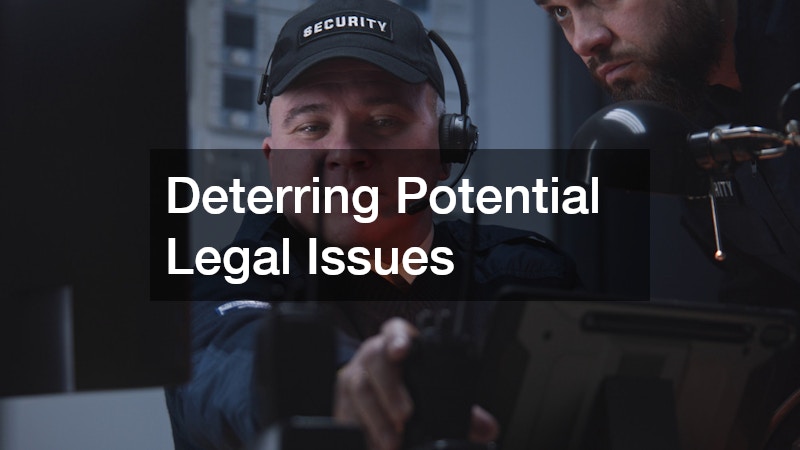Security cameras in businesses have evolved from being merely tools for preventing crime to offering a broader array of benefits. Over time, advancements in technology have transformed these devices into versatile components that provide insights not only into security but also into improving business operations. This article explores the multidimensional value of business security cameras, highlighting their role in enhancing operational efficiency, improving customer experiences, and aiding in risk management and legal protection.
How Business Security Cameras Enhance Operational Efficiency
Improved Employee Productivity
Security cameras can significantly impact employee productivity by creating an environment of accountability and transparency. With the ability to monitor workflows and daily activities, managers can identify bottlenecks and areas needing improvement, thus streamlining operations.
Moreover, the presence of cameras often encourages employees to remain diligent in their tasks, contributing to an overall increase in productivity levels.
The data captured through these devices allows for in-depth analysis of time management and task allocation, which can be crucial in optimizing workloads. Business owners can leverage this information to balance workloads better and ensure employees are working efficiently throughout their shifts. In addition, this active monitoring can help highlight exceptional work practices that can be emulated across the organization.
However, it is essential to balance surveillance with employee trust and privacy. Designing clear policies about camera usage and ensuring transparency can help maintain a positive workplace culture. Businesses can achieve the best productivity outcomes when employees understand cameras are a tool for improvement, not an intrusion into their privacy.
Monitoring Compliance with Internal Policies
Security systems are effective in ensuring adherence to company policies and procedures by providing a means of verification. Footage from these cameras can be reviewed to ensure staff follow the established safety protocols and customer service guidelines. This technology acts as a safeguard to uphold standards without relying on manual checks alone.
In retail settings, for instance, cameras can monitor point-of-sale transactions to prevent internal theft and ensure compliance with cash handling procedures. Consistency in following protocols not only protects the company’s interests but also enforces a fair and equitable working environment for all employees. Enhanced visibility into daily operations helps in identifying whether further training is needed to address policy violations effectively.
Furthermore, consistent monitoring can identify potential areas where current policies may need adjustments to better serve both the employees and the organization. By analyzing these insights, management can make informed adjustments to internal processes, ensuring that they are practical and aligned with business goals. This continuous loop of feedback helps create a more adaptive and resilient organization in a constantly changing business landscape.
The Role of Security Cameras in Customer Experience
Enhancing Customer Safety
Security cameras are integral to creating a safe environment for customers, thus enhancing their overall experience. Visible surveillance often acts as a deterrent against criminal activities, such as theft or vandalism, that could harm customers. By positioning cameras strategically, businesses show a proactive stance in prioritizing customer safety.
For example, in parking lots or entryways, cameras can monitor the area’s security, providing customers with peace of mind when entering or leaving the premises. This sense of safety can lead to increased customer loyalty and potentially drive more business, as patrons are more likely to frequent places where they feel secure. Additionally, the ability to quickly address incidents with the help of recorded footage further reinforces customer trust.
Gaining Insights into Customer Behavior
Businesses can leverage security camera footage to analyze customer trends and preferences, leading to improved services and products. By studying footage, companies can gain insights into high-traffic areas, customer dwell times, and how shoppers interact with products. These insights help tailor marketing strategies and store layouts to better meet customer needs and preferences.
Moreover, understanding traffic patterns and customer interactions aids in optimizing staffing levels and scheduling to enhance service delivery during peak times. This understanding can significantly improve customer satisfaction, transforming occasional visitors into regular patrons. Instead of relying solely on sales data, visual observations gleaned from cameras provide a more comprehensive understanding of consumer behavior.
How Security Cameras Aid in Risk Management and Legal Protection
Documentation of Incidents
Security cameras play a critical role in documenting incidents, providing vital evidence that can be crucial in legal or insurance claims. Recorded footage serves as an impartial account of events, delivering clear and credible documentation that can be indispensable in dispute resolutions. Whether dealing with customer complaints or employee incidents, this visual record is invaluable.
In the unfortunate event of workplace accidents or allegations of misconduct, having video evidence forestalls disputes and prevents potential legal battles. This documentation can facilitate quicker resolutions and promote a culture of trust and accountability within the organization. It also helps insurance companies assess claims more accurately, ensuring businesses are correctly compensated for covered events.
Deterring Potential Legal Issues
The mere presence of security cameras can deter activities that might lead to legal complications, such as workplace harassment or theft. Employees and customers alike are less likely to engage in illicit behavior when they know they are being observed. This deterrent effect reduces the likelihood of incidents occurring, thus lowering the chances of associated legal challenges.
Additionally, security cameras strengthen compliance with health and safety regulations by ensuring that a business maintains a safe environment for everyone on its premises. They provide an additional layer of oversight, ensuring rules are adhered to and potential hazards are identified promptly. Compliance not only helps in avoiding fines but also mitigates risks associated with potential lawsuits or reputational damage.
Business security cameras have become indispensable tools that extend beyond crime prevention. They play a critical role in improving operational efficiency, enhancing customer experiences, and managing risks. Through diligent integration and usage, these systems provide multifaceted benefits that streamline processes, secure environments, and safeguard the interests of all stakeholders involved.


